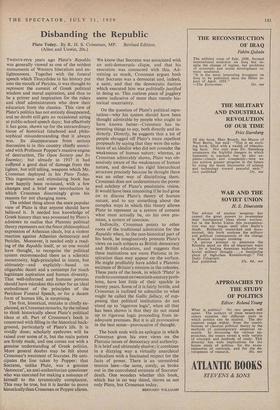Disbanding the Republic
TWENTY-FIVE years ago Plato's Republic was generally viewed as one of the noblest monuments of Western liberalism and en- lightenment. Together with the funeral speech which Thucydides in his history put into the mouth of Pericles, it was thought to represent the summit of Greek political wisdom and moral aspiration, and thus to be a primer and inspiration for the rulers and chief administrators who drew their education from the classics. This view of Plato's politics has not entirely disappeared, and no doubt still gets an occasional airing at public-school speech days; but effectively it has gone, shown up for the extraordinary tissue of historical falsehood and philo- sophical misunderstanding that it always was. Its disappearance from serious discussion is in this country chiefly associ- ated with Professor Popper's massive engine of destruction, The Open Society and Its Enemies; but already in 1937 it had suffered a good deal of damage from the lighter, but still telling, weapons which Mr. Crossman deployed in his Plato Today. This ingenious and stimulating book has now happily been re-issued, with a few changes and a brief new introduction in which Crossman disarmingly gives his reasons for not changing more.
The oddest thing about the once popular view of Plato is that anyone should have believed it. It needed less knowledge of Greek history than was possessed by Plato's admirers to realise that Platonic political theory represents not the finest philosophical expression of Athenian ideals, but a violent reaction against Athenian democracy and Pericles. Moreover, it needed only a read- ing of the Republic itself, or so one would have thought, to recognise the political system recommended there as a sclerotic monstrosity, high-principled in intent, but ultimately—and explicitly—based on oligarchic deceit and a contempt for much legitimate aspiration and human diversity. That well-informed and humane persons should have mistaken this either for an ideal embodiment of the principles of the Periclean Funeral Speech, or for a decent form of human life, is surprising.
The first, historical, mistake is chiefly ex- plained, as Crossman remarks, by the refusal to think historically about Plato's political ideas at all. Part of Crossman's book is concerned with filling in the historical back- ground, particularly of Plato's life. It is vividly done; scholarly eyebrows will be raised over some of it, but the main points are firmly made, and one comes out with a genuine understanding of Greek politics. More general doubts may be felt about Crossman's treatment of Socrates. He anti- cipates the line taken by Popper: that Socrates, unlike Plato, was a genuine 'democrat', an anti-authoritarian questioner who was executed for making a nuisance of himself to the tyrannically complacent. This may be true, but it is harder to prove historically than Crossman or Popper allows. We know that Socrates was associated with an anti-democratic clique, and that his execution was connected with this. Ad- mitting as much, Crossman argues both that Socrates was a democrat and, indeed, a saint, and that the democratic faction which executed him was politically justified in doing so. This curious piece of jugglery seems indicative of more than merely his- torical uncertainty.
On the question of Plato's political repu- tation—why his system should have been thought admirable by people who ought to have known better—Crossman has in- teresting things to say, both directly and in- directly. Directly, he suggests that a lot of people shrugged off Plato's more repellent proposals by saying that they were the solu- tions of an idealist who did not consider the weaknesses of human nature; whereas, as Crossman admirably shows, Plato was ob- sessively aware of the weaknesses of human nature, and devised his rigid hierarchical structure precisely because he thought there was no other way of disciplining them. Crossman does not underestimate the power and subtlety of Plato's pessimistic vision. It would have been interesting if he had gone on to discuss Plato's theory of human nature, and to say something about the complex ways in which this theory allows Plato to represent as a system of consent what must actually be, on his own pre- mises, a system of coercion.
Indirectly, Crossman points to other roots of the traditional admiration for the Republic when, in the non-historical part of his book, he imaginatively presents Plato's views on such subjects as British democracy and British education, and suggests that these institutions are more Platonic in in- spiration than may appear on the surface. He might profitably have added a Platonic estimate of Britain's mission in the colonies. These parts of the book, in which 'Plato' is made to comment on twentieth-century prob- lems, have lost little of their sparkle in twenty years. Some of it is fairly brittle, and Crossman is inclined to subscribe to what might be called the Gallic fallacy, of sup- posing that political institutions do not stand up to 'rigorous logic', when all that has been shown is that they do not stand up to rigorous logic proceeding from in- adequate premises. But it is all provocative in the best sense—provocative of thought.
The book ends with an epilogue in which Crossman gives his own views on the Platonic issues of democracy and authority. It is brief and ultimately elusive; it combines in a dizzying way a virtually anarchical radicalism with a fascinated respect for the facts of power. There is an unresolved tension here—the same, surely, as broke out in the convoluted estimate of Socrates' death. One wonders whether this book, which has in no way dated, shows us not only Plato, but Crossman today.
BERNARD WILLIAMS






























 Previous page
Previous page